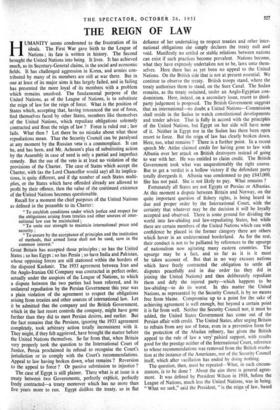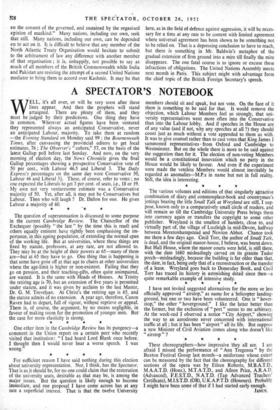THE REIGN OF LAW
HUMANITY seems condemned to the frustration of its ideals. The First War gave birth to the League of Nations ; its fate is written in history. The Second brought the United Nations into being. It lives. It has achieved much, as its Secretary-General claims, in the social and economic fields. It has challenged aggression in Korea, and armies con- tributed by many of its members are still at war there. But in one at least of its major aims it has largely failed, and in failing has presented the more loyal of its members with a problem which remains. unsolved. The fundamental purpose of the United Nations, as of the League of Nations, is to substitute the reign of law for the reign of force. What is the position of States which, accepting that, having renounced the use of force, find themselves faced by other States, members like themselves of the United Nations, which repudiate obligations solemnly contracted and flout the reign of law ? Force is ruled out ; law fails. What then ? Let there be no mistake about what these repudiations mean. That the Security Council can be paralysed at any moment by the Russian veto is a commonplace. It can be, and has tleen, and Mr. Acheson's plan of substituting action by the Assembly in case of need is only a partial and imperfect remedy. But the use of the veto is at least no violation of the provisions of the Charter. The case of States which accept the Charter, with (as the Lord Chancellor would say) all its implica- tions, is quite different, and if tip number of such States multi- plies, or the States which have offended already are allowed to profit by their offence, then the value of the continued existence of the United Nations becomes questionable.
Recall for a moment the chief purposes Of the United Nations as defined in the preamble to its Charter: " To establish conditions under which justice and respect for the obligations arising from treaties and other sources of inter- national law can be maintained ; "To unite our strength to maintain international peace and security ; " To ensure by the acceptance of principles and the institution .of methods, that armed force shall not be used, save in the common interest."
Great Britain has accepted those principles ; so has the United States ; so has Egypt ; so has Persia ; so have India and,Pakistan, whose opposing forces are still stationed within the borders of the disputed Kashmir. The 1933 agreement between Iran and the Anglo-Iranian Oil Company was contracted in perfect order, actually under the auspices of the League of Nations, to which a dispute between the two parties had been referred, and its unilateral repudiation by the Persian Government this year was a plain violation of the agreement to respect the obligations arising from treaties and other sources of international law. Let it be admitted that the company and the British Government, which in the last resort controls the company, might have gone further than they did to meet Persian desires, and earlier. But the fact remains that the Persians, ignoring the 1933 agreement completely, took arbitrary action totally inconsistent with it. They might, if they felt aggrieved, have brought the matter before the United Nations themselves. So far from that, when Britain very properly took the question to the International Court of Justice, Persia proclaimed its refusal to recognise the Court's jurisdiction or to comply with the Court's recommendations. Appeal to law having broken down, what remains ? Reversion to the appeal to force ? Or passive submission to injustice ?
The case of Egypt is still plainer. There what is at issue is a treaty between two Governments, perfectly explicit, perfectly freely contacted—a treaty moreover which has no more than five years more to run. Egypt dislikes the treaty, so in flat defiance of her undertaking to respect treaties and other inter- national obligations she simply declares the treaty null and void. Manifestly no settled or stable relations between nations can exist if such practices become prevalent. Nations become, what they have expressly undertaken not to be, laws unto them- selves. Here there has as yet been no appeal to the United Nations. On the British side that is not at present essential. We continue to observe the treaty. British troops stand, where the treaty authorises them to stand, on the Suez Canal. The Sudan remains, as the treaty ordained, under an Anglo-Egyptian con- dominium. Here, indeed, on a secondary issue, resort to third- party judgement is proposed. The British Government suggests that an international—no doubt a United Nations—Commission shall reside in the Sudan to watch constitutional developments and tender advice. That is fully in accord with the principles of the United Nations, but Egypt on her side will have none of it. Neither in Egypt nor in the Sudan has there been open resort to force. But the reign of law has clearly broken down. Here, too, what remains ? There is a further point. In a recent speech Mr. Attlee claimed credit for having gone to law with Albania over her attack on British destroyers instead of going to war with her. He was entitled to claim credit. The British Government took what was unquestionably the right course. But to get a verdict is a hollow victory if the defendant party totally disregards it. Albania was condemned to pay £843,000. She has not paid. She is not likely to pay. What remains ?
Fortunately all States are not Egypts or Persias or Albanias. At this moment a dispute between Britain and Norway, on the quite important question of fishery rights, is being heard in due and proper order by the International Court, with the certainty that whatever may be the decision it will be loyally accepted and observed. There is some ground for dividing the world into law-abiding and law-repudiating States, but while there are certain members of the United Nations which can with confidence be placed in the former Category there are others which hover in an undetermined borderland. As for the rest, their conduct is not to be palliated by references to the upsurge of nationalism now agitating many eastern countries. The upsurge may be a fact, and so far as it is it must be taken account of. But that in no way excuses nations which have freely contracted the obligation to settle all disputes peacefully and in due order (as they did in joining the United Nations) and then deliberately repudiate them and defy the injured party—which happens to be law-abiding—to do its worst. In this matter the United Nations, as represented by the Security Council, is by no means free from blame. Compromise up to a point for the sake of achieving agreement is well enough, but beyond a certain point it is far from well. Neither the Security Council nor, it must be added, the United States Government has come out of the Persian affair with credit. The United States, after urging Britain to refrain from any use of force, even in a preventive form for the protection of the Abadan refinery, has given the British appeal to the rule of law a very palsied support, with results good for the prestige neither of the International Court, reference to whose recommendations was removed from the British resolu- tion at the instance of the Americans, nor of the Security Council itself, which after vacillation has ended by doing nothing.
The question, then, must be repeated—What, in such circum- stances, is to be done ? About the aim there is general agree- ment. It was defined by President Wilson in 1918, before the League of Nations, much less the United Nations, was in being. " What we seek," said the President, " is the reign of law, based on the consent of the governed, and sustained by the organised opinion of mankind." Many nations, including our own, seek that still. Many nations, including our own, can be depended on to act on it. It is difficult to believe that any member of the North Atlantic Treaty Organisation would hesitate to submit to the arbitrament of law any difference with another member of that organisation ; it is, unhappily, not possible to say as much of all members of the British Commonwealth while India and Pakistan are resisting the attempt of a second United Nations mediator to bring them to accord over Kashmir. It may be that here, as in the field of defence against aggression, it will be neces- sary for a time at any rate to be content with limited agreement where universal agreement has been shown to be something not to be relied on. That is a depressing conclusion to have to reach, but there is something in Mr. Baldwin's metaphor of the gradual extension of firm ground into a mire till finally the mire disappears. The one fatal course is to ignore or excuse these infractions of obligations. The United Nations Assembly meets next month in Paris. This subject might with advantage form the chief topic of the British Foreign Secretary's speech.



































 Previous page
Previous page